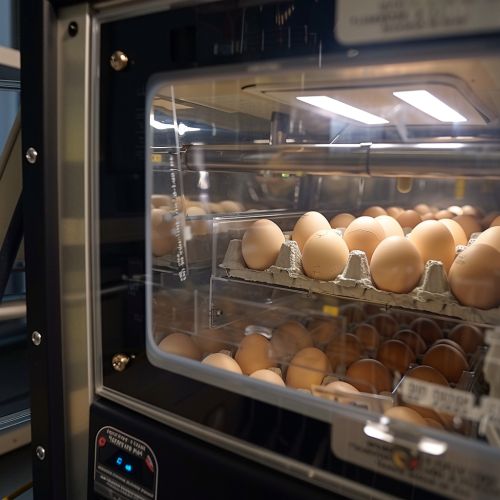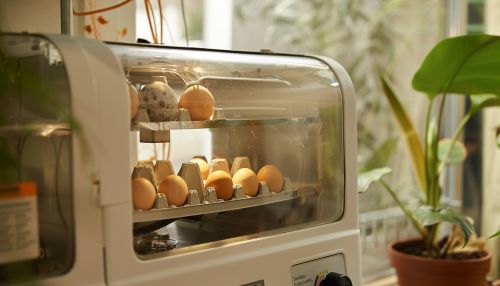Incubation: Difference between revisions
(Created page with "== Introduction == Incubation is a process that involves maintaining optimal environmental conditions to support the development of organisms, cells, or chemical reactions. This process is crucial in various fields such as biology, medicine, agriculture, and industry. The term "incubation" can refer to the natural or artificial maintenance of conditions necessary for the growth and development of embryos, microbial cultures, or chemical reactions. == Biological Incubati...") |
No edit summary |
||
| Line 12: | Line 12: | ||
Artificial incubation involves using an incubator to mimic the natural conditions required for embryo development. Incubators are devices that control temperature, humidity, and sometimes even the turning of eggs. This method is commonly used in poultry farming to hatch large numbers of eggs simultaneously. It is also employed in conservation efforts to increase the population of endangered species. | Artificial incubation involves using an incubator to mimic the natural conditions required for embryo development. Incubators are devices that control temperature, humidity, and sometimes even the turning of eggs. This method is commonly used in poultry farming to hatch large numbers of eggs simultaneously. It is also employed in conservation efforts to increase the population of endangered species. | ||
[[Image:Detail-92481.jpg|thumb|center|An incubator with eggs inside, maintaining optimal conditions for hatching.|class=only_on_mobile]] | |||
[[Image:Detail-92482.jpg|thumb|center|An incubator with eggs inside, maintaining optimal conditions for hatching.|class=only_on_desktop]] | |||
=== Microbial Incubation === | === Microbial Incubation === | ||
Latest revision as of 12:35, 14 June 2024
Introduction
Incubation is a process that involves maintaining optimal environmental conditions to support the development of organisms, cells, or chemical reactions. This process is crucial in various fields such as biology, medicine, agriculture, and industry. The term "incubation" can refer to the natural or artificial maintenance of conditions necessary for the growth and development of embryos, microbial cultures, or chemical reactions.
Biological Incubation
Embryo Incubation
Embryo incubation is a critical process in the reproduction of many species, including birds, reptiles, and some mammals. In birds and reptiles, incubation involves maintaining eggs at a specific temperature and humidity to ensure the proper development of the embryo inside. The temperature range for successful incubation varies among species but typically falls between 35°C and 40°C.
Natural Incubation
Natural incubation occurs when the parent organism provides the necessary conditions for the development of its offspring. For example, birds often incubate their eggs by sitting on them, using their body heat to maintain the appropriate temperature. The parent may also turn the eggs periodically to ensure even heat distribution and prevent the embryo from sticking to the eggshell.
Artificial Incubation
Artificial incubation involves using an incubator to mimic the natural conditions required for embryo development. Incubators are devices that control temperature, humidity, and sometimes even the turning of eggs. This method is commonly used in poultry farming to hatch large numbers of eggs simultaneously. It is also employed in conservation efforts to increase the population of endangered species.


Microbial Incubation
Microbial incubation is essential in microbiology for the cultivation and study of microorganisms such as bacteria, fungi, and viruses. This process involves placing microbial cultures in an incubator that maintains the optimal temperature, humidity, and sometimes atmospheric conditions (e.g., oxygen or carbon dioxide levels) for microbial growth.
Laboratory Incubators
Laboratory incubators are specialized devices used to grow and maintain microbial cultures. These incubators can be set to specific temperatures, typically ranging from 25°C to 37°C, depending on the type of microorganism being cultured. Some incubators also have the capability to control humidity and gas concentrations, which is crucial for the growth of certain microorganisms.
Applications
Microbial incubation has numerous applications in research, medicine, and industry. In clinical laboratories, it is used to culture pathogens from patient samples to diagnose infections. In the food industry, microbial incubation is employed to test for contamination and ensure food safety. Additionally, microbial incubation is used in biotechnology for the production of antibiotics, enzymes, and other bioactive compounds.
Chemical Incubation
Chemical incubation involves maintaining specific conditions to facilitate chemical reactions. This process is widely used in biochemistry, molecular biology, and industrial chemistry.
Enzyme Reactions
Enzyme reactions often require precise temperature and pH conditions to proceed efficiently. Incubation is used to maintain these conditions, ensuring optimal enzyme activity. For example, polymerase chain reaction (PCR), a technique used to amplify DNA, requires repeated cycles of heating and cooling to facilitate the enzymatic replication of DNA.
Industrial Applications
In industrial chemistry, incubation is used to control reaction conditions in the production of chemicals, pharmaceuticals, and other products. This process can involve maintaining specific temperatures, pressures, and concentrations of reactants to optimize yield and efficiency.
Medical Incubation
Medical incubation refers to the use of incubators in healthcare settings to support the growth and development of cells, tissues, or organisms. This includes the incubation of human embryos in assisted reproductive technologies (ART), such as in vitro fertilization (IVF), and the incubation of cell cultures for research and therapeutic purposes.
Assisted Reproductive Technologies
In ART, incubation is used to maintain embryos in optimal conditions before they are transferred to the uterus. This involves controlling temperature, humidity, and gas concentrations to mimic the natural environment of the female reproductive tract. The success of ART procedures often depends on the quality of the incubation process.
Cell Culture
Cell culture is a technique used to grow cells outside their natural environment, typically in a laboratory setting. Incubation is crucial for maintaining the appropriate conditions for cell growth and proliferation. This includes controlling temperature, humidity, and gas concentrations, as well as providing the necessary nutrients and growth factors.
Agricultural Incubation
Agricultural incubation involves the use of incubators to support the growth and development of plants and animals. This includes the incubation of seeds, eggs, and other agricultural products.
Seed Incubation
Seed incubation, also known as seed germination, involves maintaining seeds under optimal conditions to promote their growth into seedlings. This process requires controlling temperature, humidity, and sometimes light exposure. Seed incubators are used in agriculture to ensure uniform and efficient germination, which is crucial for crop production.
Animal Incubation
In addition to poultry farming, incubation is used in the breeding of other animals, such as reptiles and fish. This involves maintaining eggs or embryos under controlled conditions to ensure their successful development and hatching.
Industrial Incubation
Industrial incubation refers to the use of incubators in various industrial processes, including biotechnology, pharmaceuticals, and food production.
Biotechnology
In biotechnology, incubation is used to support the growth and production of microorganisms, cells, and bioactive compounds. This includes the fermentation of bacteria and yeast to produce antibiotics, enzymes, and other valuable products. Incubation is also used in tissue engineering to grow tissues and organs for medical applications.
Pharmaceuticals
In the pharmaceutical industry, incubation is used to support the development and testing of drugs. This includes the incubation of cell cultures and microbial cultures to study the effects of drugs and to produce pharmaceutical compounds. Incubation is also used in the quality control of pharmaceutical products to ensure their safety and efficacy.
Food Production
In food production, incubation is used to support the fermentation and processing of various food products. This includes the production of dairy products, such as yogurt and cheese, as well as the fermentation of beverages, such as beer and wine. Incubation is also used in the testing of food products for microbial contamination and spoilage.
